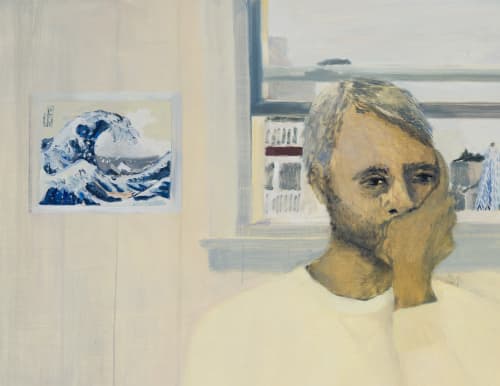M+B is pleased to present The Breakers, an exhibition of new paintings by Aubrey Levinthal. Levinthal’s work explores the hidden, unarticulated desires and feelings that transpire during daily life. Across a body of fourteen new works, she transforms quotidian moments into intimate, lyrical evocations.
This is the artist’s first solo show with the gallery and her first in Los Angeles. The exhibition will run from September 18 through October 16, 2021 at M+B Doheny (470 North Doheny Drive), with an opening reception on Saturday, September 18 from 6 to 8 pm.
Aubrey Levinthal has a lot to tell us about interior life, especially the domestic interior during quarantine. In The Breakers, Levinthal employs strange viewpoints, cropping, juxtapositions, and, often, a dulled palette communicating prolonged weariness. Late Summer is a family scene in which the father’s face appears in the bottom left corner, sunflowers drooping against his forehead. At the top edge, across the table, sits mother and son, an endless expanse separating them from the man (a perception emphasized by the tiny moon in the window). In The Boys, a father’s upper body and head fill nearly half the canvas while his son occupies a tiny space in the bottom left corner, the child even less visible because his shirt is the same color as the table. This disquieting image speaks to the oddness of family: father and son stare disconsolately to the side, even though the artist/mother’s face is visible (just barely), reflected in a napkin holder at bottom right, placing her there in the room with them. Levinthal complicates the image by including a picture of Hokusai’s The Great Wave off Kanagawa on the wall: though the room is suffused with stillness, irresistible forces like pandemic and climate change loom.
Levinthal is adept at remaking the art historical legacy every artist inherits. In Drop Off (after Venus de Vienne) she transforms the classical Crouching Venus into the working reality of a mother kneeling on the sidewalk to dig in the stroller, her child pressed against her. Far from idealizing the figure, Levinthal renders flesh with short, scraped brushstrokes, presenting the body as a locus of unease. Morning Woman is a multivalent pun: the woman sitting glumly on the edge of her tub is a bather in the long tradition of such scenes, but while this genre is normally erotic, Levinthal gives us a mourning woman, she seems to be grieving her own exhaustion.
Covid is a commanding off-screen presence, setting the scene and controlling the parameters. In Neighbor, a woman sits at home, seen only through her window, anxious and unhappy in contrast to her bright yellow shirt and curtains of the same hue. Self-checkout portrays a group of women pressed against the picture plane (two with babies). Frieze-like, they are waiting at the supermarket, one of the few remaining places we still encounter strangers. Knife Reflection is a brilliant isolation painting: Levinthal’s only company is her miniscule reflection in a knife blade; the newly purchased sunflowers already look dead, and the seeds in the cut cantaloupe resemble a scar. Levinthal’s work invites us into her world, and while it is private, we recognize it all too well.
— Daniel Gerwin
For all inquires, please contact info@mbart.com.

